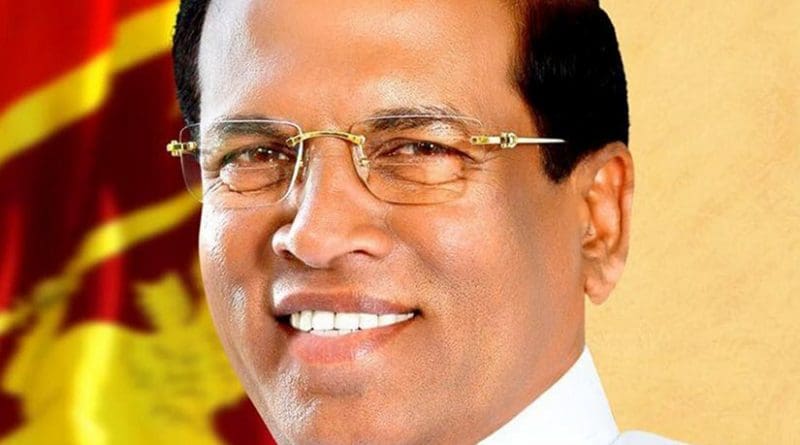Has Sri Lanka’s President Sirisena Acted Responsibly? – OpEd
The sudden decision of Sri Lankan President Maithripala Sirisena to sack tPrime Minister Ranil Wickremesinghe and later on induct the former President Mahinda Rajapaksa as the new Prime Minister has made many people wonder as to whether Maithripala Sirisena has acted responsibly and with the interest of Sri Lanka in mind.
By this unacceptable move, Sirisena has not only created a constitutional crisis in the country but has also caused considerable damage to the reputation of Sri Lanka in the eyes of the world as a country with healthy traditional democratic practices. No one can be blamed if he would suspect that Sirisena has been solely guided by his personal interest in holding on to the position of President ,rather than the long term interest of protecting the traditions and fabric of Sri Lankan democracy.
In the last national election, Sirisena’s party and Wickremesinghe’s party contested election together, opposing the former President Mahinda Rajapaksa. During the election process, Rajapaksa was criticized in harsh terms by Sirisena, even though Sirisena was serving under Rajapaksa when he was the President of Sri Lanka. Sirisena leaving the Rajapaksa government was viewed as back stabbing by Rajapaksa and both of them remained as bitter adversaries.
The mandate that Sirisena received after the election was for a joint coalition government with Wickramasinghe’s party and the verdict also reflected the rejection of Rajapaksa by the majority of the voters.
Now, by sacking Wickremesinghe and aligning himself with Mahinda Rajapaksa, Sirisena has treated the opinion and mandate of the majority of the people with contempt.
After decades of bloody civil war, Sri Lanka was returning back to normalcy. What is needed now is sustained efforts to rebuild the country’s economy with long term vision and sustained efforts, which would be possible only by ensuring smooth governance. Sirisena was given the mandate by the people only to achieve this objective.
It is well known that credit for defeating the separatists and restoring the sovereignty of Sri Lanka after protracted civil war belongs to Mahinda Rajapaksa. Inspite of this, Rajapaksa was voted out during the last election mainly due to the fact that he made the governance of Sri Lanka as a family enterprise. He brought his nearest and distant relatives to the government , gave them plum posts and many people suspected that corruption became the order of the day
Obviously, people have shown maturity in exercising the franchise and also have asserted the fact that the country men wanted clean governance.
It is surprising that Sirisena has now shown an extraordinary level of lack of statesmanship and wisdom by creating a constitutional crisis in Sri Lanka and in the process destabilizing the smooth forward path of democratic process in Sri Lanka.
If Sirisena had developed disagreement with Wickremesinghe, the obvious course of action for him is to dissolve the parliament and call for national election.
Politicians are known to be suspected tribe all over the world with regard to their targets and ambitions.
However, when the politician would become the President of the country and he would still conduct himself like an average politician , then the structure and stability of democracy in the country would suffer heavily. This is what is happening in SriLanka now
Certainly, Sirisena has done a historical mistake and caused a setback to the spirit of democracy in Sri Lanka by sacking a person who was his partner until recently and joining hands with the person who was his adversary, which is against the mandate given by the people.
It is surprising that seasoned person like Sirisena cannot see beyond himself even as he remains as President of Sri Lanka, with responsibility for ensuring that Sri Lanka would forge ahead. Sri Lankan citizens deserve better.

